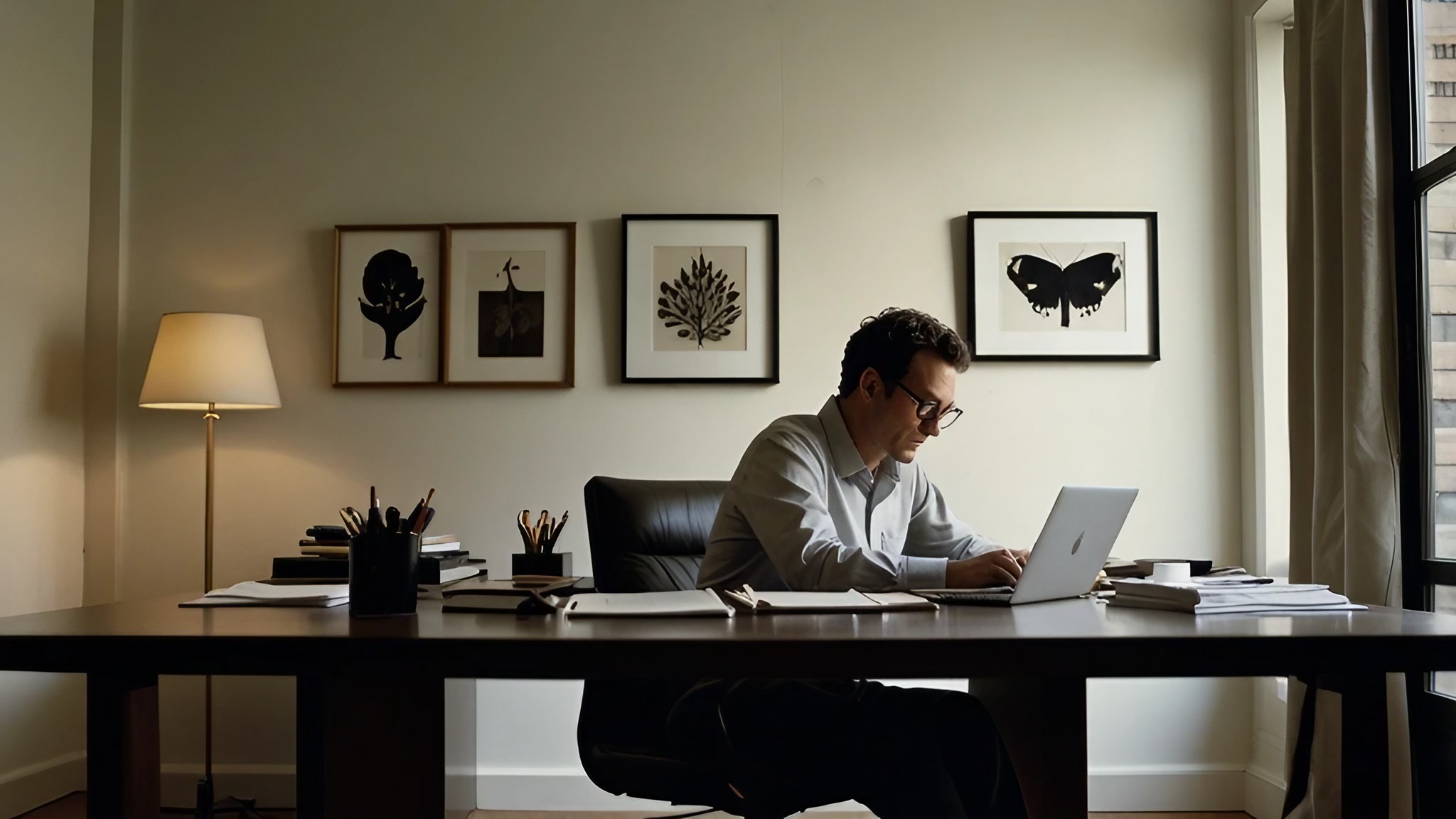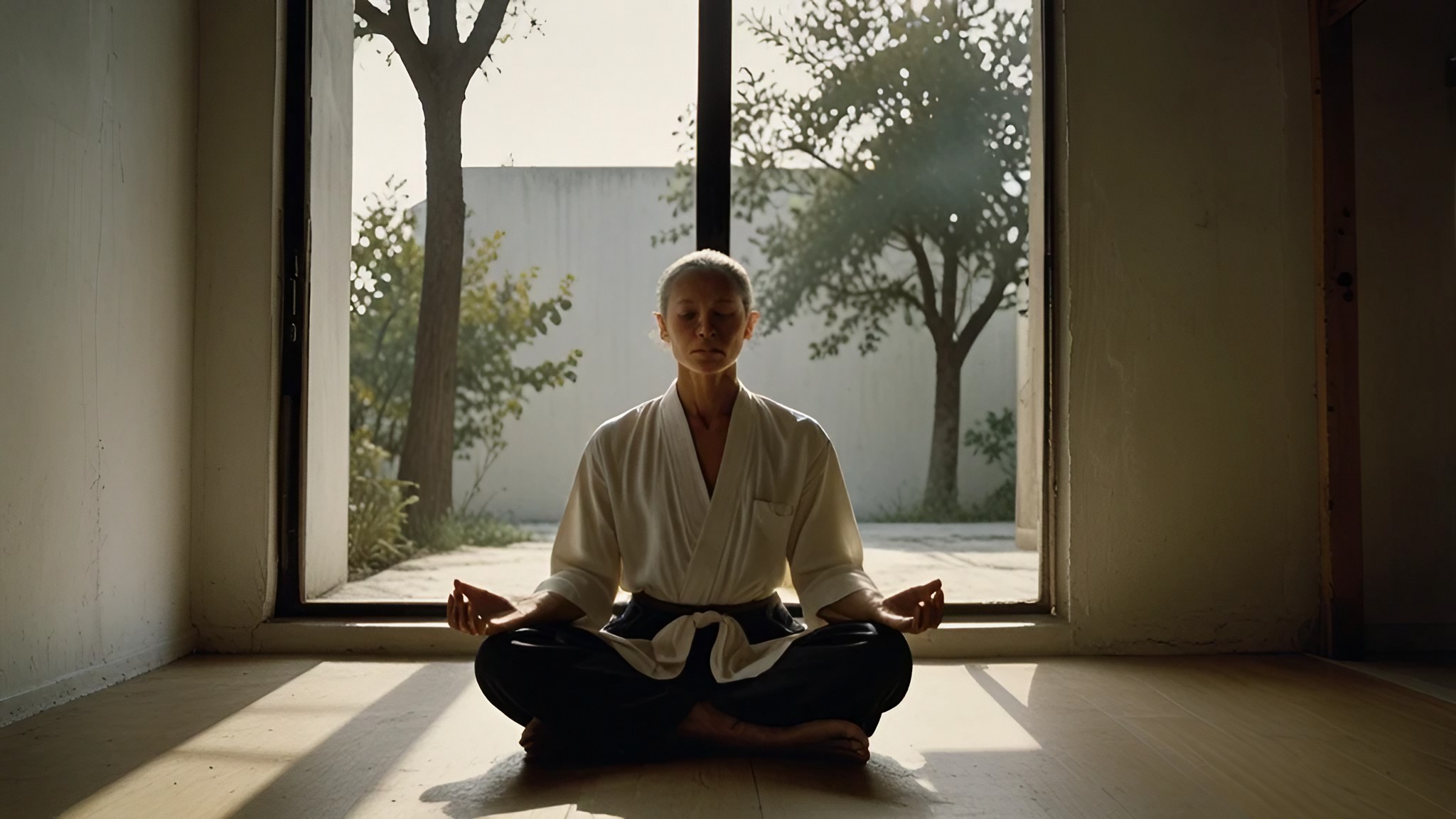Did you know that people with a strong sense of purpose actually live longer? It’s true! A study published in The Lancet found that individuals with a clear life purpose had a 15% lower risk of death compared to those who felt aimless.1 Pretty wild, right? As someone who spent years feeling like I was just going through the motions, I know that finding your purpose isn’t just about living longer – it’s about living better.
The whole “find your purpose” thing may sound like self-help nonsense. But after spending the last decade helping people discover their calling (and figuring out my own along the way), I’ve learned that having a sense of purpose is like having a personal North Star. It guides your decisions and gives meaning to your daily grind. And it makes getting out of bed in the morning a whole lot easier.
In this guide, I’m going to share everything I’ve learned about finding your life purpose. We’ll eliminate the noise and get straight to the practical stuff that actually works. Whether you’re feeling lost, stuck in a rut, or are just curious about exploring possibilities, I’ve got your back. Let’s dive in!
What Does It Mean to Have a Life Purpose?
When I first started thinking about my life purpose, I thought it had to be some grand, world-changing mission. Spoiler alert: it doesn’t! Through my years of teaching and coaching, I’ve realized that your purpose is simply the underlying ‘why’ behind what you do. It’s like your personal GPS for life’s journey.
Here’s the thing – purpose isn’t some magical destination you reach one day. Heck, I remember being so frustrated when I couldn’t figure out my “one true calling.” But then it hit me: purpose is more like a compass than a map. It points you in the right direction, even when the path isn’t clear.
Let me bust some myths for you:
- Myth #1: Your purpose has to be your job. Nope! While the lucky few align their careers with their purpose, many find purpose outside of work.
- Myth #2: You need to know your purpose by a certain age. Ha! I was 35 when I finally got clarity on mine.
- Myth #3: Your purpose never changes. Wrong again! Mine has evolved as I’ve grown and experienced more of life.
Science backs this up, too. Researchers have found that having a sense of purpose activates different parts of our brain, affecting everything from our stress levels to our decision-making abilities.2 It’s not just some feel-good concept – it’s hardwired into our biology!
Here’s what tripped me up at first: I was looking for my purpose in all the wrong places. I thought it would come to me in a dream or that I’d have some epic “a-ha!” moment. But for most of us (myself included), finding our purpose is more like putting together a puzzle. You gather the pieces over time through experiences, reflection and, honestly, a bit of trial and error.
What’s fascinating is how individual purpose can be. I’ve worked with students who found their purpose in teaching under-privileged kids, others who discovered it in sustainable farming, and some who realized their purpose was simply being the best parent they could be. There’s no one-size-fits-all when it comes to purpose!
Sometimes people struggle to find their purpose because they’re overthinking it. One of my clients, Sarah, was so paralyzed by the idea of finding her “perfect” purpose that she couldn’t take any action at all. We had to work on helping her understand that purpose isn’t about perfection – it’s about direction.
The Benefits of Living a Purpose-Driven Life

A few years ago I was at a workshop, and at the end of the day, one of my students came up to me with tears in her eyes and said, “I finally understand why I’ve been feeling so empty.” That experience hit me like a ton of bricks – I was in my element, living with purpose, and my enthusiasm had rubbed off on her. When you’re not just existing, you’re truly alive, and other people sense it.
The research on the benefits of having a life purpose is pretty impressive. Studies have shown that people who have a clear sense of purpose experience:
- Better mental health: I used to struggle with really bad anxiety. But once I found my purpose, those 3 AM worry sessions became way less frequent. Having a purpose gives your brain a better way to process stress.3
- Increased resilience: Life still throws curve balls, but when you know your ‘why,’ you bounce back faster. My first online course totally flopped, but instead of giving up, my purpose helped me to pivot and try again.4
- Improved decision-making: When you know your purpose, decisions become clearer. Should I take that job? Does this relationship align with my values? Your purpose becomes like a built-in decision-making framework.
Let me share a quick story that illustrates this perfectly. A few years back, I was offered a high-paying corporate job – the kind with fancy titles and even fancier benefits. On paper, it looked amazing. But it would have meant less time for coaching, which I knew was my true purpose. Turning it down wasn’t easy (my bank account wasn’t thrilled!), but it felt right. And you know what? That decision opened up even better opportunities that better aligned with my purpose.
The impact on relationships is another benefit that often gets overlooked. When you’re clear on your purpose, you naturally attract people who resonate with your values and vision. I’ve seen my social circle transform over the years – from people who just wanted to hang out to those who inspire and challenge me to grow.
Here’s something wild – research has even linked having a sense of purpose to better physical health! We’re talking stronger immune systems,5 better sleep,6 and even a reduced risk of heart disease.7 Who knew finding your ‘why’ could be almost as good as eating your veggies?
And career satisfaction? Don’t even get me started! When your work aligns with your purpose, even the mundane tasks feel meaningful. I remember slogging through jobs that looked good on my resume but left me feeling empty. Now, even when I’m doing something as boring as updating spreadsheets, it feels less tedious because I know it’s in service of my larger purpose.
The coolest part? These benefits create a sort of positive feedback loop. As you live more purposefully, you experience more positive outcomes, which in turn reinforces your sense of purpose. It’s like a self-fulfilling prophecy, but in the best possible way!
Key Elements of Finding Your Life Purpose

Finding your life purpose isn’t like following a recipe – add three cups of passion, mix in some talents, and voilà! If only it were that simple, right? Through years of trial and error (emphasis on the error part!), I’ve identified some key elements that will help you to piece together your purpose puzzle.
First up: understanding your core values. I learned this one the hard way. I spent years chasing what I thought should be my purpose, only to feel more lost than ever. It wasn’t until I sat down and really got honest about my values that things started clicking. Here’s a quick exercise I use with my students: imagine you’re 90 years old, looking back on your life. What would make you think, “Yep, I sure did that right”? The answers you get are golden clues to your values.
Next, it’s important to consider your natural talents and strengths. And no, I don’t mean your ability to binge-watch an entire Netflix series in one sitting (though hey, no judgment here!). I’m talking about those things that come so naturally to you, you might not even recognize them as special. For me, it was always being the person friends came to for advice. I didn’t see it as a talent until someone pointed out, “You know, not everyone can break down complex stuff the way you do.”
Then we move onto identifying your interests and passions. But wait! Before you start having flashbacks to every “follow your passion” speech you’ve ever heard, know that passion isn’t always about what makes you jump out of bed in the morning. Sometimes it’s subtle. Pay attention to what makes you lose track of time, what topics make you light up in conversation, or what section of the bookstore you naturally gravitate toward.
An element that often gets overlooked is recognizing life’s patterns and themes. Think back to the times in your life when you felt most alive, most satisfied. What common threads are there? For me, it was always moments of helping others have “a-ha!” moments. Whether I was tutoring classmates in college or helping a colleague figure out her career path, that theme kept popping up.
It’s also really important to consider impact – specifically, your impact on others. This was a huge epiphany for me. I used to think finding my purpose was all about me, but turns out, it’s just as much about how I affect the people around me. Pay attention to the feedback you get from others. What do people thank you for? What role do you naturally play in your friend group or workplace?
Lastly, and this is crucial – your purpose needs to align with your personal vision. I remember working with a client, let’s call him Tony, who was convinced his purpose was to become a high-powered corporate lawyer because that’s what his family expected. But his personal vision? It involved creativity, freedom, and making art accessible to kids in under-served communities. See the disconnect? Your purpose should feel like it’s pulling you toward your vision, not dragging you away from it.
Proven Exercises to Discover Your Purpose

Alright, time to roll up our sleeves and get practical! I’m about to share some exercises that have helped many of my students uncover their life purpose. Fair warning: some of these might make you feel a bit uncomfortable or even silly at first. Trust me, push through that feeling – the insights waiting on the other side are worth it!
We’ll start with what I call the “What Makes You Come Alive?” exercise. Grab a pen and paper or a journal or even your Notes app and answer this question: What activities make you lose track of time? I mean those things where you look up and suddenly it’s three hours later and you forgot to eat lunch. For me, it was always deep conversations about personal growth and sketching out action plans on napkins. One of my students realized she lost hours researching sustainable fashion – and this turned out to be a huge clue to her purpose!
Next up is the Ikigai framework exploration. Now, I know “ikigai” sounds like something you’d order at a fancy sushi restaurant, but it’s actually a Japanese concept that means “reason for being.” It’s where four elements intersect:
- What you love (passion)
- What the world needs (mission)
- What you’re good at (vocation)
- What you can be paid for (profession)
The first time I tried this exercise, it felt overwhelming. But here’s a tip: start with just one circle and brainstorm freely. Don’t self-edit. Write down everything, even if it seems ridiculous. One of my clients put down “talking to dogs” in her passion circle, suggesting she often found it easier to talk to dogs than to humans. And guess who now runs a successful pet therapy business?
The “Values Clarification” activity is another powerful tool. But let’s be real – just writing down “my values are x, y, and z” rarely leads to meaningful insights. Instead, try this: think of the times you’ve felt really angry or upset about something. Sounds weird, right? But our strongest emotional reactions often point to our core values. I once got seriously upset about a friend cancelling plans last minute – turned out reliability and respect for others’ time were huge values for me.
Want to have some fun? Try the “Perfect Day” visualization. Close your eyes and imagine your ideal day, from the moment you wake up to when you go to bed. But here’s the twist – don’t focus on the material stuff. Instead, pay attention to how you’re spending your time, who you’re with, and most importantly, how you feel. One of my students realized that in her perfect day, she was always teaching something – this led her to pivot from a corporate job to becoming an online course creator.
The “Legacy Writing” exercise is also really effective. Imagine you’re at your own funeral—a bit morbid, I know, but stick with me. What would you want people to say about you? What impact would you want to have left on the world? This exercise can be emotional – I definitely shed a few tears when I did it – but it’s incredibly revealing about what truly matters to you.
Finally, let’s talk about “Peak Experiences Analysis.” Think back to 3-5 moments in your life when you felt truly fulfilled, proud, or “in the zone.” Write them down in detail. What were you doing? Who was there? What made it significant? Look for patterns across these experiences. When I did this, I realized all my peak moments involved helping others overcome obstacles and achieve their goals. So little effort, so much clarity!
Remember, these exercises aren’t about getting the “right” answer – they’re about self-discovery. Some might resonate more than others, and that’s okay. The key is to approach them with curiosity and honesty. Oh, and having a sense of humour doesn’t hurt!
Common Obstacles in Finding Your Purpose (And How to Overcome Them)

Finding your life’s purpose isn’t always an easy or straightforward process. Through my years of helping people on this journey, I’ve seen some common roadblocks pop up again and again. So let’s tackle them head-on, shall we?
First up: the fear of making the wrong choice. I’ve been paralyzed by this fear myself. What if I pick the wrong purpose? What if I change my mind? Well, here’s the cold hard truth: your purpose isn’t like choosing a college major. It can (and probably will) evolve over time. One of my clients was so scared of choosing wrong that she chose nothing at all. So we worked on re-framing it: instead of trying to find the “perfect” purpose, start with a “purpose for now.” This is a bit like trying on shoes – you gotta walk in them to know if they fit.
Then there’s the whole societal and family expectations thing. A former student, let’s call him James, knew deep down his purpose was in music education, but his family had “doctor” written in stone for him since birth. The pressure was intense! We worked on a strategy I call “purpose bridging” – finding ways to honour both your inner calling and your external obligations. For James, this meant keeping his day job in healthcare while building a music education program on the side. Two years later? He’s running a successful music therapy practice. Sometimes the detour becomes the destination!
And what about financial constraints – the dream-killer, right? Wrong! Look, I get it. When you’re worried about paying rent, contemplating your life’s purpose can feel like a luxury. But your purpose doesn’t have to be your paycheck, at least not right away. Start small. If your purpose is to help others get healthy, you don’t need to quit your job and become a full-time fitness guru overnight. Begin with a blog, volunteer at a local gym, or start a weekend hiking group. Your purpose can grow alongside your bank account.
Time limitations? We all have the same 24 hours as Oprah Winfrey, but unlike Oprah, most of us don’t have a dedicated team of writers, producers, and marketing professionals to help us expand our media empire. But that doesn’t mean it’s impossible! One of my favourite exercises for clients who “don’t have time” to explore their purpose is the Time Audit. Track your time for a week – every Netflix binge, every social media rabbit hole. I guarantee you’ll find pockets of time you didn’t know you had. One client discovered she had two hours of “dead time” during her daily commute – perfect for listening to purpose-finding podcasts or brainstorming ideas!
Now, let’s talk about lack of self-awareness. This is like trying to drive to a destination when you don’t know your starting point. I’ve found that many people struggle with their purpose because they don’t really know themselves. I once had a client who was convinced her purpose was in marketing because she was “good at it.” After some deeper self-reflection exercises, she realized she was good at it because she’d adapted to please others, not because it lit her up inside. Her true purpose? Child advocacy law. Sometimes finding your purpose requires unlearning who you think you should be.
And last, but definitely not least: analysis paralysis. Oh, the number of spreadsheets I’ve seen people create trying to logic their way to their purpose! While reflection and analysis have their place, at some point, you’ve got to take action. I always tell my students: your purpose is more likely to be revealed through doing than thinking. One of my favourite quotes is, “You can’t steer a parked car.” Get moving, even if you’re not 100% sure of the direction. Clarity often comes in the curves.
Creating Your Purpose Statement

Whether you know it or not, you need a purpose statement. Before you start groaning, let me say this isn’t about crafting some fancy, corporate-sounding mission statement. This is about capturing the essence of your ‘why’ in a way that feels authentic and actually useful in your daily life.
First, let’s talk about what makes a strong purpose statement. In my experience, the best ones are:
- Clear enough that a 10-year-old could understand them
- Broad enough to evolve with you
- Specific enough to guide decision-making
- Authentic enough that saying it aloud makes you feel a little giddy
On her first go, one of my clients initially came up with this: “To leverage my unique abilities to maximize positive impact in various verticals while maintaining optimal work-life balance.” Say what now? After some coaching, we got to: “I help people find joy in moving their bodies.” Simple, clear, and actually meaningful to her!
Here’s my step-by-step guide to crafting your statement:
- Start with a brain dump. Write down everything you’ve discovered about your purpose so far. Don’t judge or edit – just get it all out there.
- Look for patterns. Circle or highlight recurring themes. One of my students noticed every example she wrote involved connecting people to resources they needed.
- Identify your ‘who’ and your ‘how’. Who do you want to serve? How do you want to serve them? One client realized his ‘who’ was young entrepreneurs and his ‘how’ was through storytelling.
- Draft your statement using this template: “I exist to [action verb] [who] to/through [how] so that [impact].”
- Test it out. Say it aloud. Does it feel true? Does it energize you? If not, keep tweaking.
Here are a few real examples from my students:
- “I exist to empower young women through financial education so they can live life on their own terms.”
- “I exist to bring joy to elderly people through art therapy so they can rediscover their zest for life.”
- “I exist to protect our planet through innovative recycling solutions so future generations can thrive.”
How do you know if your statement is working? Try using it as a decision-making tool. When an opportunity comes up, ask yourself: “Does this align with my purpose statement?” I had a client, Mark, whose purpose statement was about fostering creativity in children. When he was offered a high-paying job that would’ve meant less time for his children’s art workshops, his statement made the decision clear.
Remember, your purpose statement isn’t set in stone. Think of it as a living document that grows and evolves with you. I review mine every year, and while the core remains the same, the nuances often shift as I grow and learn.
One last tip: once you have your statement, try living with it for a week. Write it on your mirror, set it as your phone background, share it with a trusted friend. See how it feels in different contexts. Does it still ring true when you’re stuck in traffic? When you’re having a tough day at work? The best purpose statements feel true not just in the mountaintop moments, but in the valleys too.
Integrating Purpose into Your Daily Life

So, you’ve got your purpose statement – awesome! But now comes the real challenge: actually living it. The gap between knowing your purpose and living it can feel wider than the Grand Canyon. When you first identify your purpose, don’t expect the heavens to part and everything to magically fall into place. Spoiler alert: it won’t! But there are practical ways to weave purpose into the fabric of daily life.
Let’s start with your morning routine. I’m not going to tell you to wake up at 5 AM (unless that’s your thing – in which case, you do you!). But I will suggest bookending your day with purpose. For me, this means spending the first 15 minutes of my day reconnecting with my ‘why.’ Sometimes it’s meditation, sometimes it’s journaling, and sometimes it’s just enjoying my coffee while visualizing the impact I want to have that day. One of my clients, a busy mom of three, found her purpose moments during her morning shower – hey, whatever works!
Personally, I’ve found that goal-setting with purpose in mind is about a million times more effective. Instead of setting goals based on what I thought I should want, I started aligning my goals with my purpose. Here’s a quick exercise I use:
- Write down your goals
- Next to each one, write “This matters because…”
- If your ‘because’ doesn’t connect to your purpose, maybe it’s not really your goal
But what about work? This is where people often get stuck. “My job has nothing to do with my purpose!” I hear this all. the. time. Here’s the truth – your job doesn’t have to be your purpose, but it can support it. One of my students, let’s call him Tom, discovered his purpose was about fostering community. His day job? Accounting. Not exactly purpose-central, right? Wrong! He started a lunch group at work, connecting colleagues and creating the community he felt called to build. Two years later, he’s known as the heart of his company culture.
Relationships and purpose go hand-in-hand. When you’re living purposefully, you naturally attract people who resonate with your vision. But heads up – you might also outgrow some relationships, and that’s okay. One client shared that after clarifying her purpose, she realized certain friendships were holding her back. It wasn’t about ditching friends, but about being intentional with her time and energy.
Here’s something people don’t talk about enough – hobby selection and purpose. We often think hobbies are just for fun (and they should be!), but they can also be purpose-aligned. When I realized my purpose was about empowering others, I started a book club focused on personal development books. Fun and purpose-driven – win-win!
Lastly, don’t forget to schedule regular purpose check-ins. I do mine quarterly, but find what works for you. Ask yourself:
- Does my purpose still feel true?
- Where am I living my purpose well?
- Where could I align more closely with my purpose?
- What’s one small step I can take this week to live more purposefully?
When Your Purpose Evolves: Navigating Life’s Changes
About five years into living what I thought was my life purpose, everything changed. I had this moment where I realized my purpose had shifted – and it terrified me. I thought I’d done something wrong, like I’d somehow failed at being authentic and living my purpose. Now I know better, and I want to save you from the same anxiety.
First things first – let’s explore a few of the signs that your purpose might be shifting. For me, it was a growing sense of restlessness. Things that used to light me up started feeling… meh. I noticed I was drawn to different conversations, different books, different goals. One of my clients described it as feeling like she’d outgrown her skin – uncomfortable, but necessary for growth.
Life transitions often trigger purpose evolution. Think about it – major life changes like becoming a parent, changing careers, going through a health crisis, or even moving to a new place can shift our perspective and priorities. I had a student who discovered her purpose in spearheading recycling initiatives after becoming a mother. Her previous purpose didn’t disappear, but it evolved to include leaving a better planet for her child.
So, how do you gracefully pivot your purpose? Here’s what I’ve learned:
- Don’t rush it. Sit with the discomfort of the in-between phase.
- Journal about what’s calling you now vs. what called you before.
- Look for threads of continuity – often, your new purpose is an evolution, not a complete reversal.
- Test drive your new purpose before making major life changes.
Building on your existing purpose is key. It’s a bit like renovating an old house rather than knocking it down and building a new one in its place. When my purpose shifted from general personal development to specifically helping people find their purpose, I didn’t have to throw away my old skills and experiences. Instead, I got to add to them.
Here’s a secret – maintaining core values through changes keeps you grounded. Your purpose may evolve, but your values often remain consistent. One of my clients, a former teacher turned tech entrepreneur, realized that while her purpose had shifted from educating children to creating educational technology, her core value of making learning accessible remained the same.
Expert Insights: Wisdom from Purpose-Driven Individuals

Over the years, I’ve had the privilege of working with some truly inspiring individuals who’ve found and are living their purpose. Let me share some of their stories and the wisdom they’ve gained along the way.
Sarah (name changed) was a corporate lawyer who discovered her purpose was in advocacy for people dealing with mental health challenges. Her journey wasn’t straightforward – it took a mental health crisis of her own to wake her up to her calling. Now she runs a successful therapy practice while doing pro bono work for mental health organizations. Her advice? “Your struggles often point to your purpose. What breaks your heart might be what you’re meant to heal in the world.”
Then there’s Marcus, a guy who seemed to have it all – six-figure salary, corner office, luxury car. But something was missing. Through our work together, he realized his purpose was in mentoring underprivileged youth – something he’d been doing informally for years without recognizing its significance. He didn’t quit his job, but he did restructure his life to dedicate more time to mentoring. His lesson? “Your purpose doesn’t have to be your profession, but it should be your priority.”
Looking at these and other success stories, some common threads emerge:
- Most people had to overcome significant fear or resistance
- Many found their purpose was hiding in plain sight
- The journey was rarely linear or predictable
- Purpose often arose from personal pain or challenges
- Living with purpose required ongoing commitment and frequent re-calibration
One of my favourite purpose success stories is about Ella, a woman in her 50s who thought she was “too old” to find her purpose. After a lifetime of putting others first, she discovered her calling in art therapy for seniors. Now she’s running art programs in retirement communities, bringing colour and creativity to the lives of otherwise sad, lonely people. Her wisdom? “It’s never too late to become who you were meant to be.”
Conclusion
We’ve covered a lot of ground, from understanding what a life purpose really is, to navigating the evolution of your purpose. But here’s what I really want you to take away: like so many things in life, finding and living your purpose isn’t a destination – it’s a journey. And like any good journey, it’s okay if you take some detours, rest stops, or even U-turns along the way.
Remember, your purpose isn’t about being perfect or having it all figured out. It’s about living with intention, making choices that align with your values, and contributing to the world in a way that feels meaningful to you. Some days you’ll feel like you’re nailing it, and others… well, let’s just say purpose doesn’t make you immune to the trials and tribulations of life.
As you move forward on your purpose journey, keep these key points in mind:
- Start where you are. You don’t need to have it all figured out to begin.
- Your purpose will evolve, and that’s okay! Let it grow with you.
- Small, consistent actions aligned with your purpose create big impact over time.
- Your purpose is unique to you – don’t get caught up in comparing it to others.
And hey, if you’re feeling a bit overwhelmed (totally normal, by the way), just take one small step today. Maybe it’s doing one of the exercises we discussed, or simply sitting quietly and asking yourself what lights you up. Remember, every purpose-driven life started with a single step.
Here’s to living with purpose – messy, magnificent, and meaningful!
P.S. If you found this guide helpful, don’t forget to share it with someone who might need it. Sometimes, the greatest purpose we can serve is simply being the guide we wished we had.
- Cohen, R., Bavishi, C., & Rozanski, A. (2016). Purpose in Life and Its Relationship to All-Cause Mortality and Cardiovascular Events: A Meta-Analysis. Psychosomatic Medicine, 78(2), 122-133. Note: The actual meta-analysis found that having a high sense of purpose in life was associated with a reduced risk for all-cause mortality (relative risk: 0.83 [95% CI = 0.75-0.91]), which translates to approximately a 17% lower risk of death. ↩︎
- Kang, Y., Strecher, V. J., Kim, E., & Falk, E. B. (2019). Purpose in life and conflict-related neural responses during health decision-making. Health Psychology, 38(6), 545-552. ↩︎
- Kim, E. S., Sun, J. K., Park, N., & Peterson, C. (2013). Purpose in life and reduced risk of myocardial infarction among older U.S. adults with coronary heart disease: a two-year follow-up. Journal of Behavioral Medicine, 36(2), 124-133. ↩︎
- Schaefer, S. M., Morozink Boylan, J., van Reekum, C. M., Lapate, R. C., Norris, C. J., Ryff, C. D., & Davidson, R. J. (2013). Purpose in Life Predicts Better Emotional Recovery from Negative Stimuli. PLoS ONE, 8(11), e80329. ↩︎
- Ryff, C. D., Singer, B. H., & Dienberg Love, G. (2004). Positive health: connecting well-being with biology. Philosophical Transactions of the Royal Society B: Biological Sciences, 359(1449), 1383-1394. ↩︎
- Turner, A. D., Smith, C. E., & Ong, J. C. (2017). Is purpose in life associated with less sleep disturbance in older adults? Sleep Science and Practice, 1(1), 14. ↩︎
- Kim, E. S., Sun, J. K., Park, N., Kubzansky, L. D., & Peterson, C. (2013). Purpose in life and reduced risk of myocardial infarction among older U.S. adults with coronary heart disease: a two-year follow-up. Journal of Behavioral Medicine, 36(2), 124-133. ↩︎


